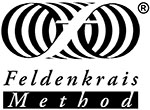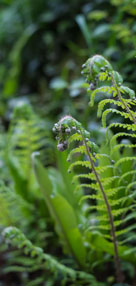
Feldenkrais training for performance and life
Rebecca Meitlis: an Interview with Lisa Dart |
 |
| Home | Individuals and Groups | Performers and Training | Schools and Colleges | News | Contact |
Interview with Lisa Dart
Back to Rebecca Meitlis
L What attracted you to the Feldenkrais Method?
R I was curious, I went to a workshop on Feldenkrais to find out what it was about, and in the afternoon we did one Awareness Through Movement lesson that had a profound effect on me. I got up from it and I found I could walk ‘normally’.
As a teenager my mother, noticed that I was not walking properly. I would walk swinging my left arm with my left foot and my right arm with my right foot (homo-laterally). So every time she shouted at me about this I would try to do right arm with left foot and left arm with right foot, but within seconds it would revert! So I worked out a very good strategy …I didn’t move my arms at all! For a good 30 years my arms stayed straight by my side, and she stopped shouting at me!
It turned out that as a baby I hadn’t gone through the whole crawling process, I had learned to stand and walk very early on, which meant was that I wasn’t well coordinated. This one Feldenkrais lesson taught me how to coordinate my pelvic and shoulder girdles and walking became a joy!
L Have you noticed any other benefits yourself?
R During the training I was going through a very unhappy period of my life. I sincerely believe that I wouldn’t have got through that period as well as I did, if I hadn’t been doing the intense work that we do during the Feldenkrais training. It helped me to be more balanced, feel better about myself and gave me more stamina than I’d had (I had suffered from health problems which were often to do with tiredness). Now that I have been doing it for many years now, I can see how it is affecting my choices in life. Looking for what feels comfortable, enjoyable, and authentic. I enjoy experimenting with the new! I have also found that I can better manage stressful situations through my intrinsic knowledge of breath and balance.
L How important was it for you to know about Moshe Feldenkrais’ background?
R It obviously gives a lot of credence to the work that he was a scientist. He was a truly curious person who really learnt through observation and experience. A lot of his understanding of the nervous system was far ahead of his time, for instance it is only recently that the phenomenon of brain plasticity can be shown and understood using imaging techniques and yet that concept is key to how his Method works. He really had an open mind and a creativity that you might associate more with artists. Of course that resonates with me.
L How does this creativity show itself in his work?
R I think he was a creative genius. I often think of his lessons as being like musical compositions; they are very well structured, each one has a clear theme, there are sets of variations, a return to the original theme, sometimes an improvisation section and often a coda. The way he developed these lessons, and there are hundreds of them, is truly the work of a creative mind.
L I understand that the lessons are available as recordings and transcripts but also that you bring your own creativity to them in the way you teach. Could you elaborate about how you bring his lessons to life?
R Again I think it’s good to think of music. It's like being an interpreter of a piece of music. First of all you honour the composer’s work or, in this case, Feldenkrais’. You want to get across what he intended to communicate through a particular lesson, but you also take into account your audience - your students. What do they need of that lesson?
So first of all I will choose lessons for the group that I think are particularly appropriate but then I will bring to it what I am fascinated by. For instance I am very interested in breathing and the power of breath.
I’m also interested in how people can be transformed through the work, understanding themselves in a new way. So my choice of vocabulary and the way I pace lessons will hopefully bring this about.
L As well as being very committed to what happens in a session, I know you want to enable your students to take things from those sessions into their lives. Why is that important to you?
R One of things that is important to me about the Feldenkrais work for myself is that I feel more able to look after my own health and well-being than I once did.
It's no good if I set up a situation where people become reliant on me to make them to feel better. What I want is to hand over the tools and understanding, so that people can look after themselves and develop. The Feldenkrais work is somatic education, not a therapy. It can help prevent chronic problems from reoccurring as you become aware of your unhelpful habits and become aware of new possibilities. You need to be able to do that in your own time and in your own way.
L How do you do that?
R. Both in individual sessions and group classes, I point out how people can use these lessons in their daily lives. How they can adapt them or use small parts of them that they found effective. I have had very good feedback about how people use lessons for long car journeys or how performers use sections of the lessons before they go on stage to perform or go for an audition.
L Your work is not only appropriate for performers but for all sorts of other people too. Can you tell me more about this?
R People usually come because of a physical issues such as; a hip or knee problems, constant back ache or shoulder pain, recovery from an accident, discomfort in walking or bending, or sitting long hours at a computer. Sessions can usually help with these problems but more importantly help discover the underlying reasons. In general it can be good for people who want to feel more confident or more centred in themselves.
L Are there any people that Feldenkrais won’t work for?
R We all need to try different things and different approaches suit different people. Probably, it is difficult for somebody who is highly competitive to enjoy Feldenkrais lessons. It is essentially about non-competition, not even with yourself. For some people in this highly competitive world it is a great relief to come to a Feldenkrais session; they don’t have to be judged, they don’t have to criticise themselves, they can experience themselves as they are in the present moment. For other people it feels like they aren't challenging themselves enough and that can seem frustrating.
The other people who find Feldenkrais difficult are those who think there is a right or wrong way of doing things. Actually what you are looking for, is what is the right for you, in that environment, at that moment, and this can be quite different from individual to individual in the same class. Each person is finding their own way of solving the puzzle the lesson presents to them. Different people will do it in different ways at different times. (That can make things very difficult as a teacher, but its essential to the lesson.) If people feel they are not doing it 'right' and that’s uncomfortable, then they might not enjoy Feldenkrais work.
L The Western assumption of a mind/body dichotomy is one that many practitioners think is false. Feldenkrais himself would not conceive of our relationship to ourselves in that way. Is that right?
R Yes. It's very difficult because the way our language is, we don’t quite have the right words. We still don’t know where our mind is, or, actually, even if it is somewhere or not. We know that our brain is body. We know we have emotional feelings in all parts of our body: our toes curl; our stomachs knot, and our hearts soften. These expressions in our language are real. Our bodies do have emotions and do have memory, and express our thoughts. So the distinction between what is mind and body is not very useful.
L How do lessons help you experience this?
R I sometimes think of Feldenkrais work as psychotherapy from the feet up! You can do an Awareness Through Movement lesson that seems to be simply about rolling or finding more movement in your shoulder and come up into standing, feeling that you can cope better with things, you're stronger, happier or more at ease with yourself. So why is that? I think if we can avoid thinking in terms of the mind/body dichotomy these experiences don’t seem so miraculous. They become an enjoyable part of ourselves.
L Why are you so passionate about this work?
R I feel the Feldenkrais work can really help people in their own development and I want to share what I’ve been so lucky to learn throughout my life. There is nothing more satisfying than seeing somebody come up from a lesson with a gentle smile on their face. A smile that might mean something is suddenly easy or comfortable, they’ve discovered something or they feel happy with themselves. It's wonderful to be able to facilitate that.
Back to Rebecca Meitlis
Return to top
| “Movement is life. Life is a process. Improve the quality of the process and you improve the quality of life itself.” Moshe Feldenkrais |
 |